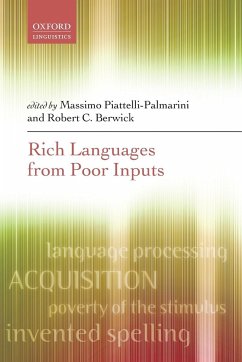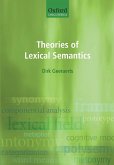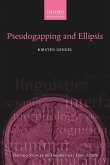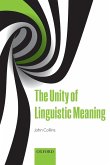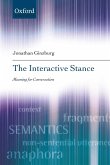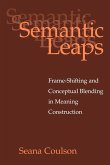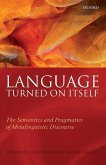Piattelli-Palmarini
RICH LANGUAGES FROM POOR INPUTS P
Piattelli-Palmarini
RICH LANGUAGES FROM POOR INPUTS P
- Broschiertes Buch
- Merkliste
- Auf die Merkliste
- Bewerten Bewerten
- Teilen
- Produkt teilen
- Produkterinnerung
- Produkterinnerung
This book addresses one of the most famous and controversial arguments in the study of language and mind, the Poverty of the Stimulus. Internationally recognised scholars consider afresh the issues surrounding this argument and discuss its relation to the process of language acquisition.
Andere Kunden interessierten sich auch für
![Theories of Lexical Semantics Theories of Lexical Semantics]() Dirk GeeraertsTheories of Lexical Semantics47,99 €
Dirk GeeraertsTheories of Lexical Semantics47,99 €![Pseudogapping and Ellipsis Pseudogapping and Ellipsis]() Kirsten GengelPseudogapping and Ellipsis56,99 €
Kirsten GengelPseudogapping and Ellipsis56,99 €![UNITY OF LINGUISTIC MEANING P UNITY OF LINGUISTIC MEANING P]() CollinsUNITY OF LINGUISTIC MEANING P37,99 €
CollinsUNITY OF LINGUISTIC MEANING P37,99 €![INTERACTIVE STANCE P INTERACTIVE STANCE P]() GinzburgINTERACTIVE STANCE P48,99 €
GinzburgINTERACTIVE STANCE P48,99 €![Semantic Leaps Semantic Leaps]() Seana CoulsonSemantic Leaps49,99 €
Seana CoulsonSemantic Leaps49,99 €![Minimal Semantics Minimal Semantics]() Emma BorgMinimal Semantics55,99 €
Emma BorgMinimal Semantics55,99 €![Language Turned on Itself Language Turned on Itself]() Herman CappelenLanguage Turned on Itself35,99 €
Herman CappelenLanguage Turned on Itself35,99 €-
-
-
This book addresses one of the most famous and controversial arguments in the study of language and mind, the Poverty of the Stimulus. Internationally recognised scholars consider afresh the issues surrounding this argument and discuss its relation to the process of language acquisition.
Produktdetails
- Produktdetails
- Verlag: Oxford University Press(UK)
- Seitenzahl: 328
- Erscheinungstermin: 27. Januar 2016
- Englisch
- Abmessung: 234mm x 156mm x 18mm
- Gewicht: 500g
- ISBN-13: 9780198736714
- ISBN-10: 0198736711
- Artikelnr.: 42724231
- Herstellerkennzeichnung
- Libri GmbH
- Europaallee 1
- 36244 Bad Hersfeld
- gpsr@libri.de
- Verlag: Oxford University Press(UK)
- Seitenzahl: 328
- Erscheinungstermin: 27. Januar 2016
- Englisch
- Abmessung: 234mm x 156mm x 18mm
- Gewicht: 500g
- ISBN-13: 9780198736714
- ISBN-10: 0198736711
- Artikelnr.: 42724231
- Herstellerkennzeichnung
- Libri GmbH
- Europaallee 1
- 36244 Bad Hersfeld
- gpsr@libri.de
Massimo Piattelli-Palmarini is Professor Cognitive Science at the University of Arizona and a member of the Department of Linguistics, the Cognitive Science Program, and the Department of Psychology. In October 1975 he organized the encounter between Jean Piaget and Noam Chomsky and in 1980 edited the proceedings Language and Learning, now translated into 11 languages and the echoes of which still explictly resonate in the present volume. He is the editor, with Juan Uriagereka and Pello Salaburu, of Minds and Language: A Dialogue with Noam Chomsky in the Basque Country (OUP, 2009; paperback 2010), and author, with Jerrry Fodor, of What Darwin Got Wrong (Profile, 2010). Robert C. Berwick is Professor of Computer Science and Computational Linguistics at the Massachusetts Institute of Technology. He has published more than half a dozen books on the nature of language, language learnability, and computation, starting from his 1982 dissertation, The Acquisition of Syntactic Knowledge (MIT Press) to The Grammatical Basis of Linguistic Performance (MIT Press, 1986), Computational Complexity and Natural Language (MIT Press, 1987), and Principle-Based Parsing (Kluwer, 1999). Most recently, he has focused on the biology of language, particularly language evolution.
* 1: Massimo Piattelli-Palmarini and Robert C Berwick: Introduction
* Part 1 Poverty of the Stimulus and Modularity Revisited
* 2: Robert C. Berwick, Noam Chomsky, and Massimo Piattelli-Palmarini:
Poverty of the Stimulus stands: Why recent challenges fail
* 3: Xuan-Nga Cao Kam and Janet Dean Fodor: Children's acquisition of
syntax: Simple models are too simple
* 4: Noam Chomsky: Poverty of the Stimulus: Willingness to be puzzled
* 5: Susan Curtiss: Revisiting modularity: Using language as a window
to the mind
* 6: Lila Gleitman and Barbara Landau: Every child an isolate: Nature's
experiments in language learning
* Part 2: Discrepancies Between Child Grammar and Adult Grammar
* 7: Jean-Rémy Hochman and Jacques Mehler: Recent findings About
language acquisition
* 8: Adriana Belletti and Luigi Rizzi: Ways of avoiding intervention:
Some thoughts on the development of object relatives, passive, and
control
* 9: Itziar Laka: Merging from the temporal input: On subject-object
asymmetries and an ergative language
* 10: Ken Wexler: Tough-movement developmental delay: Another effect of
phasal computation
* 11: Julie Anne Legate and Charles Yang: Assessing child and adult
grammar
* 12: Thomas G. Bever: Three aspects of the relation between lexical
and syntactic knowledge
* Part 3: Broadening the Picture: Spelling andRreading
* 13: Charles Read and Rebecca Treiman: Children's invented spelling:
What we have learned in forty years
* 14: Stephanie Gottwald and Maryane Wolf: How insights into child
language changed the development of written language
* 15: Wayne O'Neil: The phonology of invented spelling
* 16: Merryl Goldberg: The arts as language: Invention, identity, and
learning
* References
* Index
* Part 1 Poverty of the Stimulus and Modularity Revisited
* 2: Robert C. Berwick, Noam Chomsky, and Massimo Piattelli-Palmarini:
Poverty of the Stimulus stands: Why recent challenges fail
* 3: Xuan-Nga Cao Kam and Janet Dean Fodor: Children's acquisition of
syntax: Simple models are too simple
* 4: Noam Chomsky: Poverty of the Stimulus: Willingness to be puzzled
* 5: Susan Curtiss: Revisiting modularity: Using language as a window
to the mind
* 6: Lila Gleitman and Barbara Landau: Every child an isolate: Nature's
experiments in language learning
* Part 2: Discrepancies Between Child Grammar and Adult Grammar
* 7: Jean-Rémy Hochman and Jacques Mehler: Recent findings About
language acquisition
* 8: Adriana Belletti and Luigi Rizzi: Ways of avoiding intervention:
Some thoughts on the development of object relatives, passive, and
control
* 9: Itziar Laka: Merging from the temporal input: On subject-object
asymmetries and an ergative language
* 10: Ken Wexler: Tough-movement developmental delay: Another effect of
phasal computation
* 11: Julie Anne Legate and Charles Yang: Assessing child and adult
grammar
* 12: Thomas G. Bever: Three aspects of the relation between lexical
and syntactic knowledge
* Part 3: Broadening the Picture: Spelling andRreading
* 13: Charles Read and Rebecca Treiman: Children's invented spelling:
What we have learned in forty years
* 14: Stephanie Gottwald and Maryane Wolf: How insights into child
language changed the development of written language
* 15: Wayne O'Neil: The phonology of invented spelling
* 16: Merryl Goldberg: The arts as language: Invention, identity, and
learning
* References
* Index
* 1: Massimo Piattelli-Palmarini and Robert C Berwick: Introduction
* Part 1 Poverty of the Stimulus and Modularity Revisited
* 2: Robert C. Berwick, Noam Chomsky, and Massimo Piattelli-Palmarini:
Poverty of the Stimulus stands: Why recent challenges fail
* 3: Xuan-Nga Cao Kam and Janet Dean Fodor: Children's acquisition of
syntax: Simple models are too simple
* 4: Noam Chomsky: Poverty of the Stimulus: Willingness to be puzzled
* 5: Susan Curtiss: Revisiting modularity: Using language as a window
to the mind
* 6: Lila Gleitman and Barbara Landau: Every child an isolate: Nature's
experiments in language learning
* Part 2: Discrepancies Between Child Grammar and Adult Grammar
* 7: Jean-Rémy Hochman and Jacques Mehler: Recent findings About
language acquisition
* 8: Adriana Belletti and Luigi Rizzi: Ways of avoiding intervention:
Some thoughts on the development of object relatives, passive, and
control
* 9: Itziar Laka: Merging from the temporal input: On subject-object
asymmetries and an ergative language
* 10: Ken Wexler: Tough-movement developmental delay: Another effect of
phasal computation
* 11: Julie Anne Legate and Charles Yang: Assessing child and adult
grammar
* 12: Thomas G. Bever: Three aspects of the relation between lexical
and syntactic knowledge
* Part 3: Broadening the Picture: Spelling andRreading
* 13: Charles Read and Rebecca Treiman: Children's invented spelling:
What we have learned in forty years
* 14: Stephanie Gottwald and Maryane Wolf: How insights into child
language changed the development of written language
* 15: Wayne O'Neil: The phonology of invented spelling
* 16: Merryl Goldberg: The arts as language: Invention, identity, and
learning
* References
* Index
* Part 1 Poverty of the Stimulus and Modularity Revisited
* 2: Robert C. Berwick, Noam Chomsky, and Massimo Piattelli-Palmarini:
Poverty of the Stimulus stands: Why recent challenges fail
* 3: Xuan-Nga Cao Kam and Janet Dean Fodor: Children's acquisition of
syntax: Simple models are too simple
* 4: Noam Chomsky: Poverty of the Stimulus: Willingness to be puzzled
* 5: Susan Curtiss: Revisiting modularity: Using language as a window
to the mind
* 6: Lila Gleitman and Barbara Landau: Every child an isolate: Nature's
experiments in language learning
* Part 2: Discrepancies Between Child Grammar and Adult Grammar
* 7: Jean-Rémy Hochman and Jacques Mehler: Recent findings About
language acquisition
* 8: Adriana Belletti and Luigi Rizzi: Ways of avoiding intervention:
Some thoughts on the development of object relatives, passive, and
control
* 9: Itziar Laka: Merging from the temporal input: On subject-object
asymmetries and an ergative language
* 10: Ken Wexler: Tough-movement developmental delay: Another effect of
phasal computation
* 11: Julie Anne Legate and Charles Yang: Assessing child and adult
grammar
* 12: Thomas G. Bever: Three aspects of the relation between lexical
and syntactic knowledge
* Part 3: Broadening the Picture: Spelling andRreading
* 13: Charles Read and Rebecca Treiman: Children's invented spelling:
What we have learned in forty years
* 14: Stephanie Gottwald and Maryane Wolf: How insights into child
language changed the development of written language
* 15: Wayne O'Neil: The phonology of invented spelling
* 16: Merryl Goldberg: The arts as language: Invention, identity, and
learning
* References
* Index

